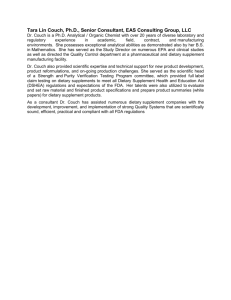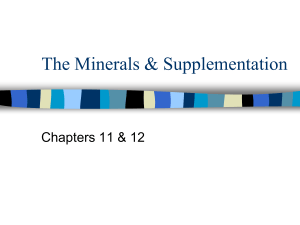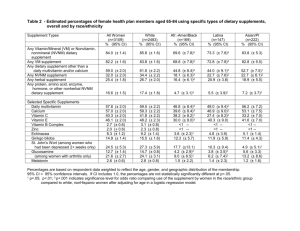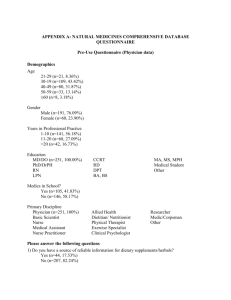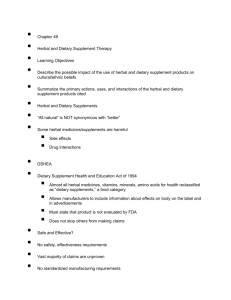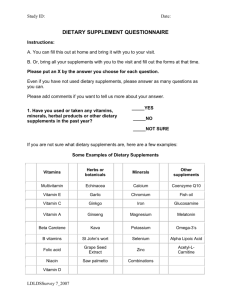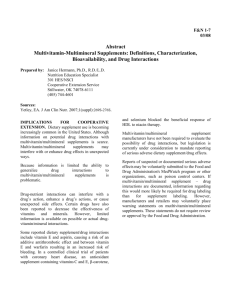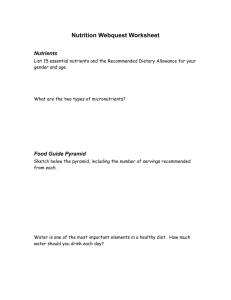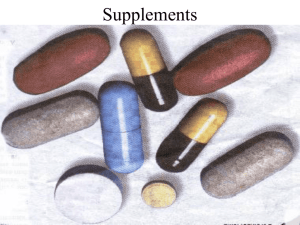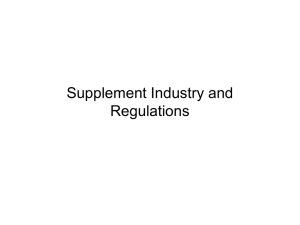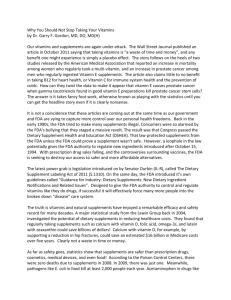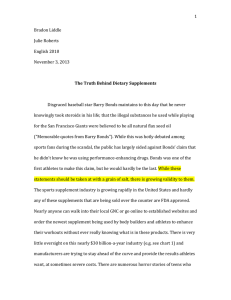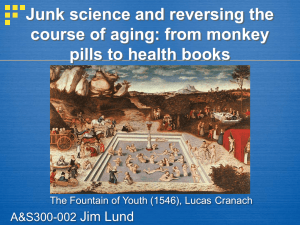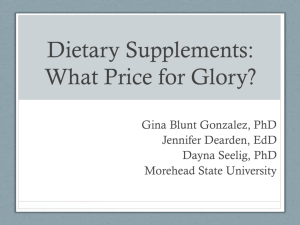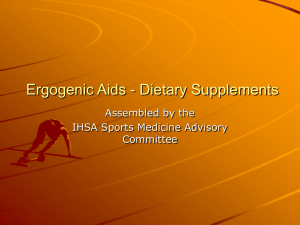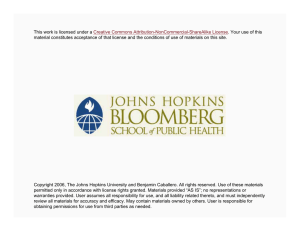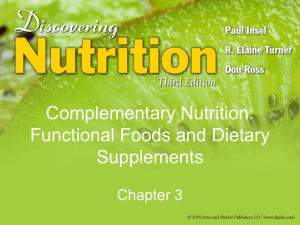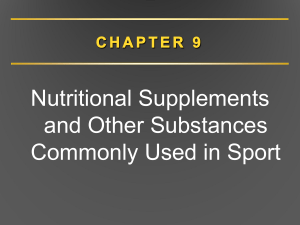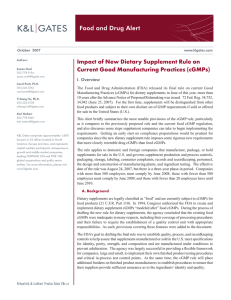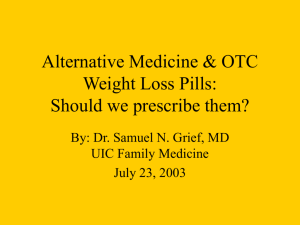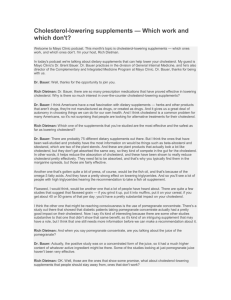Phytochemicals
advertisement
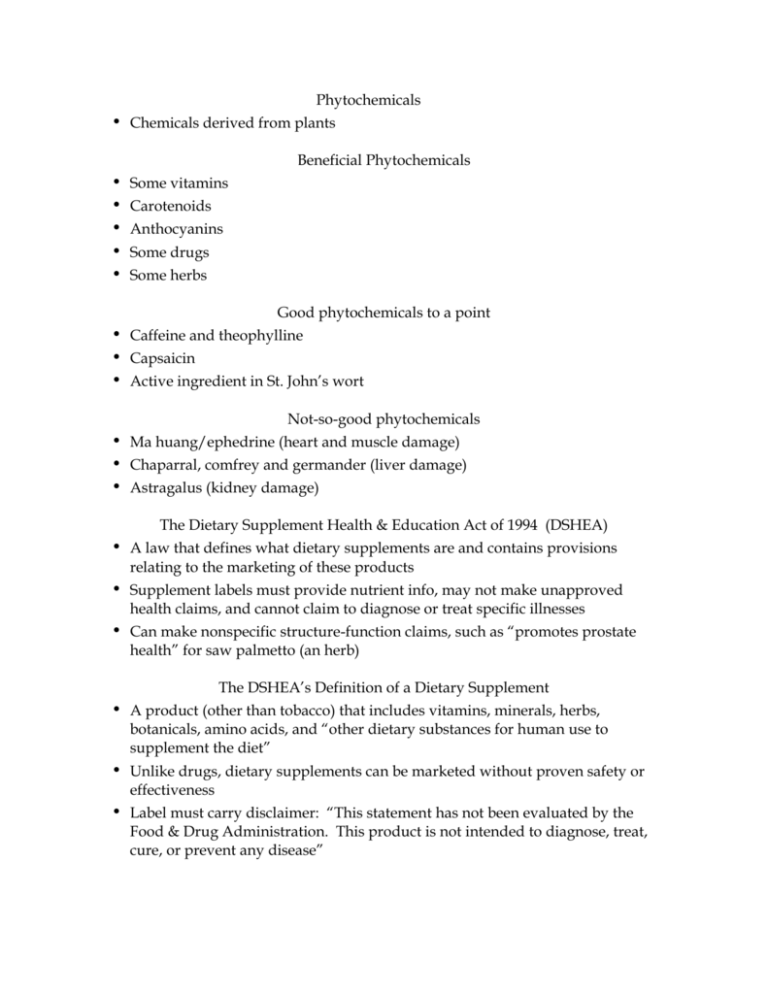
Phytochemicals • Chemicals derived from plants Beneficial Phytochemicals • • • • • Some vitamins Carotenoids Anthocyanins Some drugs Some herbs Good phytochemicals to a point • • • Caffeine and theophylline Capsaicin Active ingredient in St. John’s wort Not-so-good phytochemicals • • • Ma huang/ephedrine (heart and muscle damage) Chaparral, comfrey and germander (liver damage) Astragalus (kidney damage) The Dietary Supplement Health & Education Act of 1994 (DSHEA) • A law that defines what dietary supplements are and contains provisions relating to the marketing of these products • Supplement labels must provide nutrient info, may not make unapproved health claims, and cannot claim to diagnose or treat specific illnesses • Can make nonspecific structure-function claims, such as “promotes prostate health” for saw palmetto (an herb) The DSHEA’s Definition of a Dietary Supplement • A product (other than tobacco) that includes vitamins, minerals, herbs, botanicals, amino acids, and “other dietary substances for human use to supplement the diet” • Unlike drugs, dietary supplements can be marketed without proven safety or effectiveness • Label must carry disclaimer: “This statement has not been evaluated by the Food & Drug Administration. This product is not intended to diagnose, treat, cure, or prevent any disease” DSHEA deregulated the supplement industry • FDA has to show that a particular supplement is harmful, BUT it is powerless (and understaffed) to act unless people die • Even then, some very harmful supplements are still on the market-e.g., ma huang • Still other supplements may not have the quantities of the active ingredient that they claim to have Herbal Supplements • • • Fall under dietary supplements • For some herbs, active ingredient is unknown Do not trust labels-Consumerlab.com Some herbs can interfere with blood clotting, anesthesia, other drugs (anti-HIV drugs, oral contraceptives) Forms of Herbal Preps • • • • The dried plant part Water extract Tinctures--usually alcohol extracts Purified and dried active compound(s) Herbs can interact with drugs • • Many interact with coumadin bloodthinners St. John’s wort interacts with oral contraceptives, protease inhibitors (HIV drugs), cyclosporine (used in transplant patients) “Should I be taking a supplement, Dr. Fuller?” Questions to ask before taking supplements • • • Am I trying to make up for my lousy diet? Is this going to impact any drugs I need to take? Is there a less expensive alternative? Some partial answers • • • • Women of childbearing age should be getting folic acid Calcium supplements are a good idea for some Babies who are getting breast milk need vitamin D supplements Don’t take more than you need – E.g., iron in men Nutrition and cancers • Open to interpretation What is cancer? • Characterized by uncontrolled cell growth, lack of differentiation, and ability to invade local tissues and metastasize (spread to distant sites via blood or lymphatic system) • Can strike any tissue at any age Stages of carcinogenesis • • • • Initiation Promotion Progression Time from initiation event to actual diagnosis can be decades Cancer initiators and promoters • • • • • Viruses--human papilloma viruses & cervical cancer Oncogenes--brca1, brca2 Immune disorders Tobacco smoke Ultraviolet light Dietary Factors & Cancer • • • • Energy--lifelong Calorie restriction can reduce incidence of cancer--in rodents Fat--relationship to cancers controversial Obesity--obese people are more prone to cancer EtOH-Seems to have synergistic effect (1+1=5) with tobacco for CA’s of mouth, pharynx, larynx, & esophagus • Flavonoids-Little solid human evidence • Carotenoids-High consumption of fruits and vegetables associated with lower incidence of CA’s, BUT intervention studies with beta-carotene showed otherwise Cancer Treatment • • • Surgery Radiation therapy Chemotherapy Why do cancer patients go for alternative treatments? • • • • Conventional therapies aren’t very effective on some cancers Counter patients’ feelings of helplessness Belief that “if it’s natural it must be better” It gives patient something that they can “do” in the face of a life-threatening disease 6 simple rules for evaluating dietary claims (Lett, 1990) • • • • • • Falsifiability Logic Comprehensiveness Honesty Replicability Sufficiency
